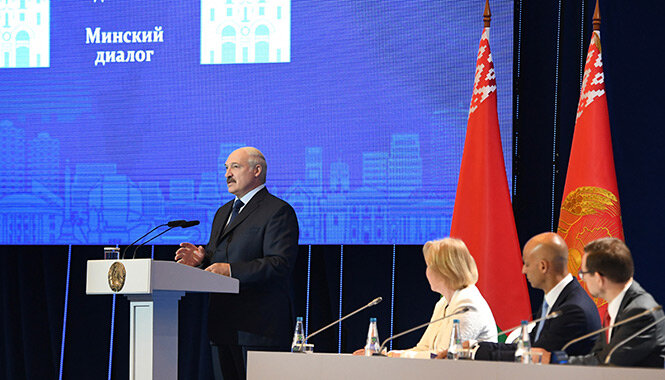International forum “Eastern Europe: In Search of Security for All”
- 13
The importance of Minsk as a convenient negotiations’ venue is increasing, Belarus’ President Aleksandr Lukashenko said at the international forum “Eastern Europe: In Search of Security for All” on 24 May.
“It is for a reason that this event is taking place in Minsk. It has already become traditional for representatives of various countries and regions across the global to come here to discuss absolutely any topics, even the most critical ones, in a quiet environment and total safety. Due to the country’s multi-vector foreign policy, respect for foreign partners, sustainable social and economic development, the country’s role as a convenient venue for all types of negotiations is increasing,” the head of state said.
He noted that the conference drew experts and scientists from Western and Eastern Europe, Russia, the United States and China. “This is a testimony to the global nature of the issues you are discussing. After all, we are talking about conceptual aspects of international security, specific “hot” and “frozen” conflicts”, Aleksandr Lukashenko said.
In his words, the expert platform in Minsk is designed to facilitate the exchange of opinion and a well-reasoned discussion and to launch a dialogue the international relations need so badly.
“Any reasonable person would confirm that there is nothing more important today than peace and sustainable development. Therefore, it is of paramount importance to come up with clear-cut proposals on how to accommodate the interests of all the parties concerned. It is obvious for many people that since the end of the Cold War, Europe’s security architecture has never experienced such a systemic crisis,” the Belarusian leader emphasized.
The President reminded that Belarus came forward with the initiative to launch a new large-scale international dialogue on security that should strive to overcome existing disagreements between the states in the Euro-Atlantic Region and in Eurasia. “It does not matter how you call it – New Helsinki Process, Helsinki-2 or any other name. It does not matter, either, where it will take place. And it does not matter at all who initiates this process. We all should initiate it, because peace is what matters most. It is important to make sure that such a dialogue gets underway and results in real improvement of international security,” Aleksandr Lukashenko noted.
“It is time major geopolitical players started to reflect on the status of contemporary international relations, which is very reminiscent of the situation before the First World War. According to FRG Federal President Frank-Walter Steinmeier, back then ‘relations between the continental great powers had been built on sand’ and ‘foreign policy lacked both the will and tools to foster a peaceful balance of interests.’ He described that period as ‘a disturbing tale of the failure of the governing elites and the military, but also of diplomacy’.
Aleksandr Lukashenko believes that some politicians have already forgotten the horrors of the Second World War, which ended not long ago.
“The great powers that were expected to be reliable guarantors of stability are unable to agree on any major issue today. On the one hand, they talk about the importance of preserving the architecture of modern security. On the other, they do not abandon attempts to circumvent the veto in the UN Security Council,” the President noted.
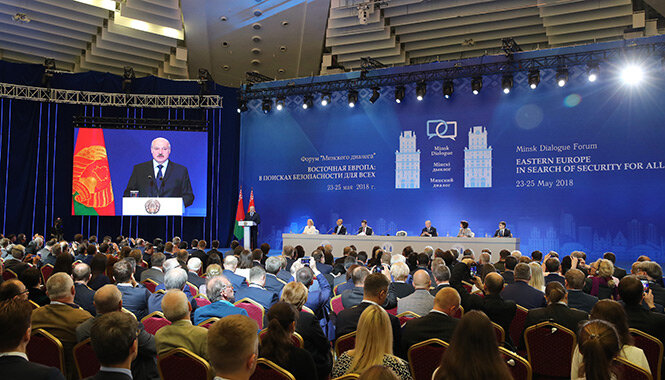
Aleksandr Lukashenko expressed his concern over the lack of guarantees against large-scale armed conflict, even if unintentional. In the face of the current global geopolitical and economic transformations in the world, the fundamental contradictions between states are accumulating and aggravating.
“Once again, strategic rivalry and competition between the major powers are placed on the forestage. Once again, even under pretexts, they rely on force, including military one, as one of the ways to advance their interests. Direct and indirect violation of international law and disregard of it become a frightening practice justified by like-for-like actions from opponents,” the Belarusian leader said.
Aleksandr Lukashenko drew attention to the fact that sanctions, information confrontation and trade wars between the West and Russia are growing worse. Tensions are fueled between the US, the EU and Russia, with the attempts to involve China. The arms race is gathering pace.
The President noted that the most important feature of today's situation is unpredictability, when even the so-called red lines stop no one any longer.
New "mutated" challenges are emerging alongside with the unprecedented growth of terrorism and the number of regional conflicts, powerful social and economic imbalances, and fundamental demographic and environmental threats. The head of state mentioned electronic and digital methods used in the political struggle and media space, cyber influence which has become a factor of universal vulnerability.
“Even the elite sport, including the Olympic Games which once were a symbol of reconciliation, is becoming a bargaining chip in political games again,” the President said.
According to the President, it is obvious that many of the old recipes for global and regional governance, settlement of conflicts and natural contradictions are not suitable any more. “They often fail to work and the new ones have not been developed yet. Unfortunately, in this situation, the world players are not ready to stop the spiral of confrontation, are not ready to make compromises. We can see that no international problem is resolved,” Aleksandr Lukashenko said.
He cited a number of examples, including the Middle East, Syria, and Ukraine. The situation around North Korea is tense as well. “The dangerous knot around the agreement on Iran’s nuclear program has been tightening once again. It is important that not only Russia, our ally, but also the European Union sees a threat to security in the region in connection with the violation of the current agreements,” the head of state said.
“Belarus, and many countries of Central and Eastern Europe, whose representatives are present here, are facing the prospect of finding themselves on the fault line of civilization. I am sure that such a prospect facing the aforementioned countries is unacceptable. Already apparent is the interrelation between the seemingly distant conflicts in other regions of the world and illegal migration, as well as the threat of terrorism in Europe. Security has grown from the abstract concept into a concrete, tangible phenomenon. Its absence can affect anyone of us,” the Belarusian leader noted.
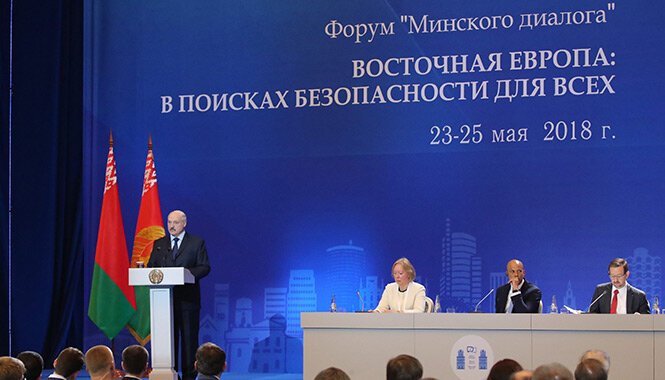
“If the great powers cannot come to an agreement today, this does not mean all other countries should sit and wait for their instructions. I am convinced that Europe can and should take the lead in resolving issues between East and West and become a place to regulate pressing problems, first of all, such as the Ukrainian crisis,” the head of state said.
Aleksandr Lukashenko said: “We’ve heard accusations lately that we allegedly aspire to become peacemakers. We don’t. We have our own fair share of problems to deal with. But I’ve already mentioned our interest in tranquility in Ukraine. If there is no peace in Ukraine, not only we but all of you will feel the heat. This conflict must be finished as soon as possible. You can count on us in this matter. We will do everything the conflicting sides will agree on.”
The head of state pointed out that guiltless civilians continue being killed in the Donbass area. Not a single provision of the Minsk agreements has been fully fulfilled.
“Ukraine is not just a neighbor of ours. Just like Russians it is a brotherly nation. Within a short period of time we’ve welcomed over 150,000 Ukrainian immigrants and their families. We help them find jobs, get healthcare. We help them with social and psychological adaptation. We provide humanitarian aid to people on both sides of the ‘dividing line’ in the Donbass area,” noted the Belarusian leader. “Whatever format the negotiations on Ukraine may use, the sides can always count on Belarus’ assistance.”
Aleksandr Lukashenko said he was convinced that rejecting emotions, the accumulated sorrows, prejudices, preconceptions, and mutual accusations in favor of resuming the dialogue is the only way to resolve any international disputes.
“Belarus is a sovereign state and is clearly aware of its position in the international axis system. We are not with Russia against Europe. Nor we are with Europe against Russia and the entire East. For us the question who we are with is unacceptable in principle. Our position gives an answer to this question. The Belarusian people have not chosen this place to live. Hence our foreign policy, and the position of general,” he noted.
According to the President, Belarus’ allied relations with Russia, its orientation toward integration within the Eurasian Economic Union does not affect the interests of the European countries. Development of relations with the EU, the United States and the West does not contradict the close cooperation in the East, but serves as a basis for creating a zone of confidence.
“Belarus’ foreign policy initiatives are widely known. They include the promotion of the ideas of partnership between the integration unions in Greater Europe, the renewal of the pan-European dialogue on strengthening security and cooperation. They make up the unifying agenda that Minsk suggests to other members of the international community,” the head of state said.
“Economic security has always been one of key components of Belarus’ security. This component should underpin everything. Economic growth will secure jobs and consequently some earnings for people to meet their needs and provide for their families. This will help maintain peace. We have been consistently promoting such an approach at all levels, including the OSCE,” Aleksandr Lukashenko noted.
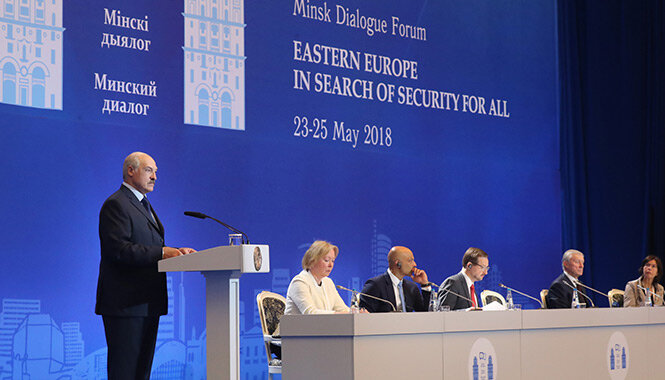
According to the President, many countries underestimate the role of multi-level integration projects while trying to achieve peaceful and sustainable development of the region against the backdrop of an increasing geopolitical confrontation.
Located at the junction of the Eurasian Economic Union and the European Union, Belarus wants the two unions to come closer. It is necessary to move from abstract talks to specific joint action. There is a tremendous amount of areas of common interest, like economy, power engineering, environment, humanitarian cooperation, transport, logistics, and the war on illegal migration, transnational crime, drug abuse, human trafficking, just to name a few, the head of state noted.
They can serve as a springboard for gradual rapprochement of the two biggest integration associations and for boosting mutual trust, Aleksandr Lukashenko is convinced. “We believe that this will greatly benefit the entire continent – from the Atlantic to the Pacific,” Aleksandr Lukashenko noted.
“There should not be new dividing lines. Protracted conflicts can be resolved by means of multilateral economic cooperation. This logic should be set against the idea that the West and East do not need each other,” the President noted.
The head of state underlined that nations need to learn again to listen to and hear each other, and to be ready for reasonable compromises. “I am talking about Russian, European, American and Chinese partners, about big and small countries, close and distant neighbors,” the Belarusian leader added.
“The multi-polar world has become a reality. The influence of other, non-European regions has increased. It is necessary to gradually expand the format of dialogue within the OSCE, attract such players as India, Japan and, of course, China ehich thanks to its Belt and Road initiative is gradually becoming a factor in European politics, whether some like it or not,” Aleksandr Lukashenko said.
According to him, the need in the like-minded states who are interested in a constructive discussion of the whole complex of problems is now greater than ever.
The President stated that the security crisis, growing confrontation and the almost complete absence of trust the possibilities of diplomacy are considerably limited. They are critically low.
One of the most effective platforms for dialogue is the OSCE which we need to to support together, if you prefer to revive. Many have forgotten what the OSCE is. We see efforts in this regard of Secretary General Greminger, as well as the current OSCE Italian Presidency. But they will achieve nothing if they act alone. They need the support,” the head of state noted.
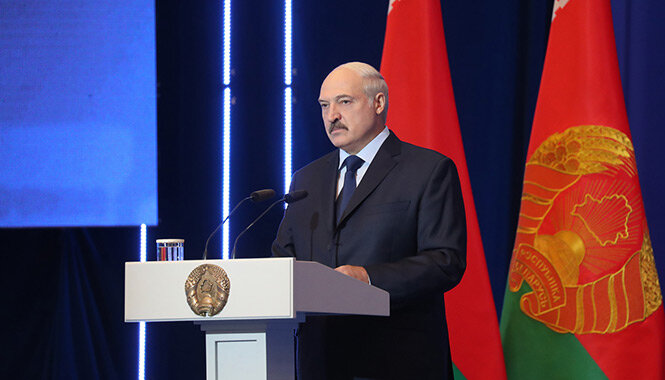
Belarus is ready to cooperate with the leadership, executive bodies and institutions of this organization, the Italian Presidency, with all states parties sharing these approaches. “We speak the same language, in the spirit of Helsinki,” Aleksandr Lukashenko said.
The President is convinced that such a dialogue, no matter how much time it might require and whatever forms it might take, will ultimately lead to the development of new constructive relations in the OSCE zone.
“We understand that this work will be difficult, long and will require consolidation of our efforts. We can and must build on the positive experience of the Helsinki process which contributed to the resolution of many international issues. However, we should get rid of illusions and avoid mistakes while developing this process in our region. It does not have to be reproduced automatically,” the Belarusian leader said.
“Due to the irreconcilability of positions of the major powers, small and medium-sized countries receive a unique opportunity to initiate proposals for dialogue and confidence-building measures. It is important to take advantage of this opportunity rather than play the role of extras or allies within military and political blocs such as NATO or the CSTO. It is necessary to break the monopoly of dialogue between large countries on these issues,” stressed Aleksandr Lukashenko.
NATO should take a more responsible position, the President added. “Many of the problems we have faced today were caused by the NATO expansion to the east. I have the right to say this, because it all happened in front on my eyes, the first President of Belarus,” the head of state said.
Aleksandr Lukashenko also commented on the actions of some politicians which can have a negative impact on the situation in the world. “Watching the actions of some politicians of large states we try to understand their motives, first of all. It seems to me that some of them believe: ‘Today I say something, no matter what, and tomorrow it will all be gone’. The biggest mistake of these politicians is that after saying or doing something it is impossible to turn the clock back,” the President said.
“So before saying and taking seemingly small steps in one direction or another, we need to think what to say, and most importantly what to do. We need to understand that any such step could lead to consequences that could draw not only our countries but also other nations in the process unacceptable for the world,” he said.
“You are the experts. You are the people who form the views of politicians. You do not just have an influence on politicians or write speeches. You make the essence of the policy which the politicians and their countries pursue. It is time for you to think about how our planet will develop not only tomorrow but also in the longer term,” the head of state said.
